34 start with C start with C
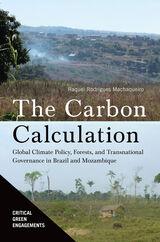
Focusing on REDD+ (Reducing Emissions from Deforestation and Forest Degradation), the book demonstrates how industrialized countries are able to maintain their socioeconomic models largely unaltered while claiming to address global warming using forests in the Global South to offset their pollution. By examining the creation and implementation of REDD+ historically and ethnographically, the book traces the social life of this mechanism as it travels across a complex network spanning several interacting levels: international, national, and local. Through cases in the Brazilian state of Acre and the Zambézia province in Mozambique, the author demonstrates how global climate policy has created new opportunities and rationales for unprecedented levels of intervention in the Global South—all under the guise of saving the planet.
The Carbon Calculation critically highlights the ways in which politics has reinforced a scientific focus on one possible solution to the problem of climate change—namely those that largely absolve the industrialized world from undertaking politically painful transformations in its own economic model.
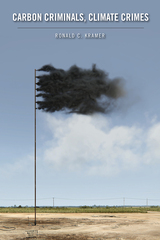
Carbon Criminals, Climate Crimes analyzes the looming threats posed by climate change from a criminological perspective. It advances the field of green criminology through a examination of the criminal nature of catastrophic environmental harms resulting from the release of greenhouse gases. The book describes and explains what corporations in the fossil fuel industry, the U.S. government, and the international political community did, or failed to do, in relation to global warming. Carbon Criminals, Climate Crimes integrates research and theory from a wide variety of disciplines, to analyze four specific state-corporate climate crimes: continued extraction of fossil fuels and rising carbon emissions; political omission (failure) related to the mitigation of these emissions; socially organized climate change denial; and climate crimes of empire, which include militaristic forms of adaptation to climate disruption. The final chapter reviews policies that could mitigate greenhouse gas emissions, adapt to a warming world, and achieve climate justice.
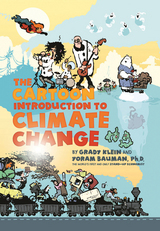
"Stand-up economist" Yoram Bauman and award-winning illustrator Grady Klein have created the funniest overview of climate science, predictions, and policy that you’ll ever read. You’ll giggle, but you’ll also learn-about everything from Milankovitch cycles to carbon taxes.
If those subjects sound daunting, consider that Bauman and Klein have already written two enormously successful cartoon guides to economics, making this notoriously dismal science accessible to countless readers. Bauman has a PhD in economics and has taught at both the high school and college level, but he now makes a living performing at comedy clubs, universities, and conferences, sharing the stage with personalities as diverse as Robin Williams and Paul Krugman.
The authors know how to get a laugh-and they know their facts. This cartoon introduction is based on the latest report from the authoritative Intergovernmental Panel on Climate Change (IPCC) and integrates Bauman’s expertise on economics and policy.
If economics can be funny, then climate science can be a riot. Sociologists have argued that we don’t address global warming because it’s too big and frightening to get our heads around. The Cartoon Introduction to Climate Change takes the intimidation and gloom out of one of the most complex and hotly debated challenges of our time.
References available at http://standupeconomist.com/cartoon-climate/
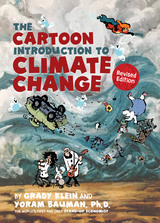
That creativity comes from the minds of Yoram Bauman, the world’s first and only “stand-up economist,” and award-winning illustrator Grady Klein. After seeing their book used in classrooms and the halls of Congress alike, the pair has teamed up again to fully update the guide with the latest scientific data from the IPCC (Intergovernmental Panel on Climate Change).
A lot has happened to the climate over the last decade, and the authors tackle the daunting statistics with their trademark humor. They realize it’s better to laugh than cry when confronting mind-blowing facts about our changing world. Readers will become familiar with critical concepts, but they’ll also smile as they learn about climate science, projections, and policy.
Sociologists have argued that we don’t address climate change because it’s too big and frightening to get our heads around. The Cartoon Introduction to Climate Change takes the intimidation and gloom out of one of the most important challenges of our time.
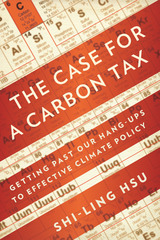
Shi-Ling Hsu examines the four major approaches to curbing CO2: cap-and-trade; command and control regulation; government subsidies of alternative energy; and carbon taxes. Weighing the economic, social, administrative, and political merits of each, he demonstrates why a tax is currently the most effective policy. Hsu does not claim that a tax is the perfect or only solution-but that unlike the alternatives, it can be implemented immediately and paired effectively with other approaches.
In fact, the only real barrier is psychological. While politicians can present subsidies and cap-and-trade as "win-win" solutions, the costs of a tax are immediately apparent. Hsu deftly explores the social and political factors that prevent us from embracing this commonsense approach. And he shows why we must get past our hang-ups if we are to avert a global crisis.
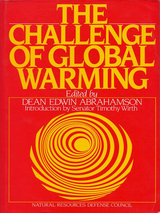
Challenge of Global Warming examines the causes and effects of global climate change.
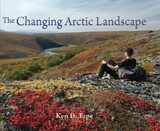
The resulting volume is a stunning reminder of inexorable change; divided into sections on vegetation, permafrost, and glaciers, the images show the startling effects of climate change. In addition, each section presents a short biography of a pioneering scientist who was instrumental in both obtaining the antique photographs and advancing the study of arctic ecosystems, as well as interviews with scientists who have spent decades working in Alaska for the United States Geological Survey. The Changing Arctic Landscape is a profile of transformation—complex and not yet fully understood.
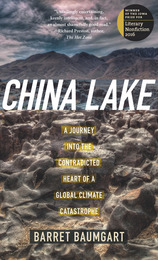
Stalking the fringes of Internet conspiracy, speculative science, and contemporary archaeology, Baumgart weaves memoir, military history, and investigative journalism in a dizzying journey that carries him from the cornfields of Iowa to drought-riddled California, from the Vietnam jungle to the caves of prehistoric Europe and eventually the walls of the US Capitol, the sparkling white hallways of the Pentagon, and straight into the contradicted heart of a worldwide climate emergency.
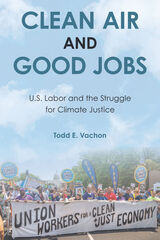
The labor–climate movement in the U.S. laid the groundwork for the Green New Deal by building a base within labor for supporting climate protection as a vehicle for good jobs. But as we confront the climate crisis and seek environmental justice, a “jobs vs. environment” discourse often pits workers against climate activists. How can we make a “just transition” moving away from fossil fuels, while also compensating for the human cost when jobs are lost or displaced?
In his timely book, Clean Air and Good Jobs, Todd Vachon examines the labor–climate movement and demonstrates what can be envisioned and accomplished when climate justice is on labor’s agenda and unions work together with other social movements to formulate bold solutions to the climate crisis. Vachon profiles the workers and union leaders who have been waging a slow, but steadily growing revolution within their unions to make labor as a whole an active and progressive champion for both workers and the environment.
Clean Air and Good Jobs examines the “movement within the movement” offering useful solutions to the dual crises of climate and inequality.
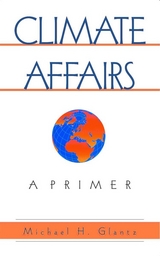
Climate Affairs sets forth in a concise primer the base of knowledge needed to begin to address questions surrounding the unknown impacts of climate change. In so doing, it outlines a new approach to understanding the interactions among climate, society, and the environment. Chapters consider:
• the effects of climate around the world
• important but overlooked aspects of climate-society-environment interactions
• examples of societal uses, misuses, and potential uses of climate-related information such as forecasts
• a research agenda, challenges, and methodologies for future climate research.
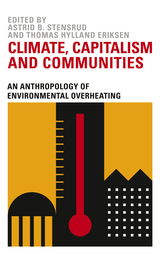
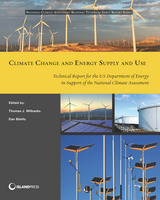
Knowledge of today’s available energy forms is constantly surfacing and changing in the face of climate change, making it increasingly important to enhance communication about various energy supplies. This report on energy supply and use summarizes current knowledge, especially emerging findings, about implications of climate change for energy production and supply (oil and gas, thermal electricity, renewable energy, integrated perspectives, and indirect impacts on energy systems). A comprehensive resource for community planners and researchers, it discusses future risk-management strategies surrounding water treatment, heating or cooling, and mitigation that the country can utilize in its energy consumption. The authors analyze findings from their own research and practice to arrive at conclusions about vulnerabilities, risks, and impact concerns for different aspects of U.S. energy supply and use. Global and national policy contexts are informed by these efforts to create energy options and choices.
Rich in science and case studies, Climate Change and Energy Supply and Use offers decision makers and stakeholders a substantial basis from which to make informed choices that will affect energy risk-management in the decades to come.
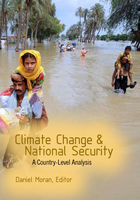
In this unique and innovative contribution to environmental security, an international team of scholars explore and estimate the intermediate-term security risks that climate change may pose for the United States, its allies and partners, and for regional and global order through the year 2030. In profiles of forty-two key countries and regions, each contributor considers the problems that climate change will pose for existing institutions and practices. By focusing on the conduct of individual states or groups of nations, the results add new precision to our understanding of the way environmental stress may be translated into political, social, economic, and military challenges in the future.
Countries and regions covered in the book include China, Vietnam, The Philippines, Indonesia, India, Pakistan, Bangladesh, Central Asia, the European Union, the Persian Gulf, Egypt, Turkey, the Maghreb, West Africa, Southern Africa, the Northern Andes, and Brazil.
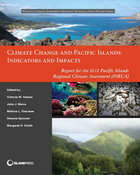
The book provides the basis for understanding the key observations and impacts from climate change in the region, including the rise in surface air and sea-surface temperatures, along with sea levels, and the changes in ocean chemistry, rainfall amount and distribution, weather extremes, and widespread ecosystem changes.
Rich in science and case studies, it examines the latest climate change impacts, scenarios, vulnerabilities, and adaptive capacity and offers decision makers and stakeholders a substantial basis from which to make informed choices that will affect the well-being of the region’s inhabitants in the decades to come.
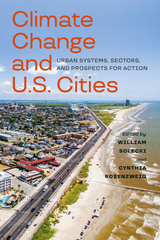
Prepared as a follow-up to the Fourth National Climate Assessment (NCA), Climate Change and U.S. Cities documents the current understanding of existing and future climate risk for U.S. cities, urban systems, and the residents that depend on them. Beginning with an examination of the existing science since 2012, chapters develop connections between existing and emerging climate risk, adaptation planning, and the role of networks and organizations in facilitating climate action in cities. From studies revealing disaster vulnerability among low-income populations to the development of key indicators for tracking climate change, this is an essential, foundational analysis. Importantly, the assessment puts a critical emphasis on the cross-cutting factors of economics, equity, and governance.
Urban stakeholders and decision makers will come away with a full picture of existing climate risks and a set of conclusions and recommendations for action. Many cities in the United States still have not yet planned for climate change and the costs of inaction are great. With bold analysis, Climate Change and U.S. Cities reveals the need for action and the tools that cities must harness to effect decisive, meaningful change.
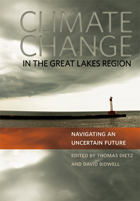
People living in the Great Lakes region are already feeling the effects of a changing climate. Shifts in seasonal temperatures and precipitation patterns could have dramatic impacts on the economy, ecology, and quality of life. In this illuminating and thorough volume, leading scholars address the challenge of preparing for climate change in the region, where decision makers from various sectors—government, agriculture, recreation, and tourism—must increasingly be aware of the need to incorporate climate change into their short- and long-term planning. The chapters in this revealing book, written by some of the foremost climate change scholars in North America, outline the major trends in the climate of the Great Lakes region, how humans might cope with the uncertainty of climate change impacts, and examples of on-the-ground projects that have addressed these issues.
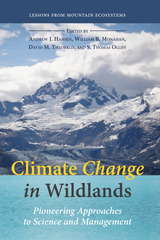
Teaming with NASA and the Department of the Interior, ecologist Andrew Hansen, along with his team of scientists and managers, set out to understand how climate and land use changes affect montane landscapes of the Rockies and the Appalachians, and how these findings can be applied to wildlands elsewhere. They examine changes over the past century as well as expected future change, assess the vulnerability of species and ecosystems to these changes, and provide new, collaborative management approaches to mitigate expected impacts. A series of case studies showcases how managers might tackle such wide-ranging problems as the effects of warming streams on cold-water fish in Great Smoky Mountain National Park and dying white-bark pine stands in the Greater Yellowstone area. A surprising finding is that species and ecosystems vary dramatically in vulnerability to climate change. While many will suffer severe effects, others may actually benefit from projected changes.
Climate Change in Wildlands is a collaboration between scientists and managers, providing a science-derived framework and common-sense approaches for keeping parks and protected areas healthy on a rapidly changing planet.
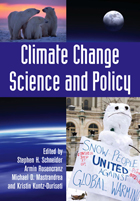
Questions surrounding the issue of climate change are evolving from "Is it happening?" to "What can be done about it?" The primary obstacles to addressing it at this point are not scientific but political and economic; nonetheless a quick resolution is unlikely.
Ignorance and confusion surrounding the issue -- including a lack of understanding of climate science, its implications for the environment and society, and the range of policy options available -- contributes to the political morass over dealing with climate change in which we find ourselves. Climate Change Policy addresses that situation by bringing together a wide range of new writings from leading experts that examine the many dimensions of the topics most important in understanding climate change and policies to combat it. Chapters consider:
- climate science in historical perspective
- analysis of uncertainties in climate science and policy
- the economics of climate policy
- North-South and intergenerational equity issues
- the role of business and industry in climate solutions
- policy mechanisms including joint implementation, emissions trading, and the so-called clean development mechanism
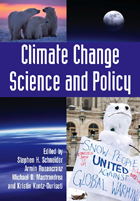
In many ways, this volume supersedes the Fourth Assessment Report of the Intergovernmental Panel on Climate Change (IPCC). Many important developments too recent to be treated by the 2007 IPCC documents are covered here. This book considers not only the IPCC report, but also results of the UN Framework Convention on Climate Change held in Bali in December 2007, as well as even more recent research data. Overall, Climate Change Science and Policy paints a direr picture of the effects of climate change than do the IPCC reports. It reveals that climate change has progressed faster than the IPCC reports anticipated and that the outlook for the future is bleaker than the IPCC reported.
In his prologue, John P. Holdren writes that the widely-used term “ global warming” is a misnomer. He suggests that a more accurate label would be “ global climatic disruption.” This volume, he states, will equip readers with all they need to know to rebut the misrepresentations being propagated by “ climate-change skeptics.” No one, he writes, will be a skeptic after reading this book.
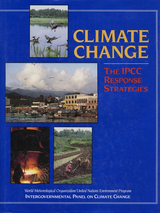
Climate Change is the report of Working Group III of the Intergovernmental Panel on Climate Change (IPCC), established in 1988 by the World Meteorological Organization and UNEP to address the threat of global warming on an international scale.
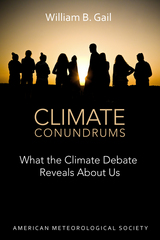
Climate Conundrums is a journey through how we as humans think, individually and collectively, about the debate. It eschews rhetoric or fist-pounding conclusions and instead explores our ongoing attempts to reach a societal understanding about climate change and how we should respond to it. The essays throughout are broadly organized around our relationship with nature, the challenges facing human society, and the path ahead for civilization. Each begins with a question—Can we make nature better? Could science and religion reconcile?—and from there follows an introspective path through all sides of the debates. Some are longstanding issues, such as whether humans are growing increasingly distant from nature. Others are brought on by recent developments, such as whether technology can eventually solve all of society’s needs.
While no final answers are given, the insights that come from reflecting on these questions can help us better find our way and better connect with each other across the climate divide.
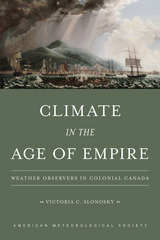
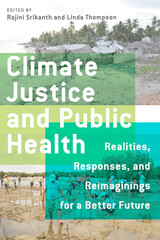
When climate disasters like hurricanes, heatwaves, and tsunamis strike, they reveal the inequities of our social, political, and economic structures. They also lay bare the negative impacts of these structures on the health and safety of all people, and particularly socioeconomically vulnerable groups. With original contributions from scholars from a wide range of diverse fields—including environmental studies, public health, legal studies, urban planning, literary studies, and nursing—Climate Justice and Public Health examines this nexus of climate change, which has become impossible to ignore in the twenty-first century.
Expanding the climate and health equity discussions to populations all over the globe, the contributors in this volume address an impressive and broad range of topics that include Indigenous health and cultural practices, mental and emotional health, senior health, and impacts on African American communities. Collectively, they present radical new ways of confronting these issues and propose holistic solutions.
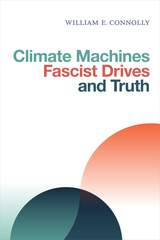
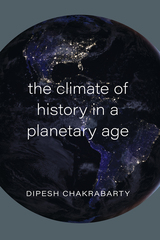
Chakrabarty argues that we must see ourselves from two perspectives at once: the planetary and the global. This distinction is central to Chakrabarty’s work—the globe is a human-centric construction, while a planetary perspective intentionally decenters the human. Featuring wide-ranging excursions into historical and philosophical literatures, The Climate of History in a Planetary Age boldly considers how to frame the human condition in troubled times. As we open ourselves to the implications of the Anthropocene, few writers are as likely as Chakrabarty to shape our understanding of the best way forward.
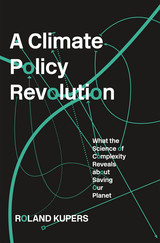
Humanity’s best hope for confronting the looming climate crisis rests with the new science of complexity.
The sheer complexity of climate change stops most solutions in their tracks. How do we give up fossil fuels when energy is connected to everything, from great-power contests to the value of your pension? Global economic growth depends on consumption, but that also produces the garbage now choking the oceans. To give up cars, coal, or meat would upend industries and entire ways of life. Faced with seemingly impossible tradeoffs, politicians dither and economists offer solutions at the margins, all while we flirt with the sixth extinction.
That’s why humanity’s last best hope is the young science of complex systems. Quitting coal, making autonomous cars ubiquitous, ending the middle-class addiction to consumption: all necessary to head off climate catastrophe, all deemed fantasies by pundits and policymakers, and all plausible in a complex systems view.
Roland Kupers shows how we have already broken the interwoven path dependencies that make fundamental change so daunting. Consider the mid-2000s, when, against all predictions, the United States rapidly switched from a reliance on coal primarily to natural gas. The change required targeted regulations, a few lone investors, independent researchers, and generous technology subsidies. But in a stunningly short period of time, shale oil nudged out coal, and carbon dioxide emissions dropped by 10 percent. Kupers shows how to replicate such patterns in order to improve transit, reduce plastics consumption, and temper the environmental impact of middle-class diets. Whether dissecting China’s Ecological Civilization or the United States’ Green New Deal, Kupers describes what’s folly, what’s possible, and which solutions just might work.
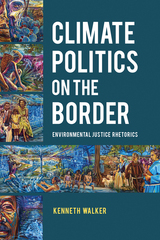
As a borderland city with generations of slow violence and extreme weather events like flash flooding and intense heat waves, San Antonio, Texas, speaks directly to global issues in climate politics. In Climate Politics on the Border: Environmental Justice Rhetorics, Kenneth Walker takes a place-based approach to his study of San Antonio to explore how extreme weather events and responses to them shape local places, publics, and politics, with an eye toward a future characterized by severe climate breakdown.
Attending to the local histories and micropolitics of San Antonio, Walker examines the effects of extreme weather events as they are experienced across radically inequitable social categories. These local histories serve as a guide, not just for future climates, which stand to be unprecedented, but for the necessary public and political responses to them. He shows how extreme weather events in the past have reinforced colonial social orders that weaken democratic goals of pluralism and equity. Conversely, he also shows how diverse coalitions have resisted and responded to these forces.
Walker examines the ethics of Latinx and Anglo relations within state-sponsored productions of racial inequity and environmental degradation, the coalitional capacities of environmental activists and second-wave Chicana/o organizations to protect clean water and transform local political representation, the obligations of place-keeping in Latinx urban design and ecological restoration, and the need to foster pluriversal worlds in city-level climate action and adaptation plans. Collectively these chapters rethink tropes of adaptation, resilience, and coalition as rhetorical and ecological capacities for public and political responses to extractivism.
Based on years of archival work and fieldwork, Climate Politics on the Border demonstrates vividly why ecological and anticolonial approaches to rhetoric are essential for grappling with climate politics. Overall, this is a timely study of how environmental degradation, pollution, and climate change are disputed and negotiated at the local political level in a borderland community.
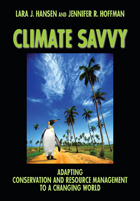
In Climate Savvy, climate change experts Lara Hansen and Jennifer Hoffman offer 18 chapters that consider the implications of climate change for key resource management issues of our time—invasive species, corridors and connectivity, ecological restoration, pollution, and many others. How will strategies need to change to facilitate adaptation to a new climate regime? What steps can we take to promote resilience?
Based on collaboration with a wide range of scientists, conservation leaders, and practitioners, the authors present general ideas as well as practical steps and strategies that can help cope with this new reality.
While climate change poses real threats, it also provides a chance for creative new thinking. Climate Savvy offers a wide-ranging exploration of how scientists, managers, and policymakers can use the challenge of climate change as an opportunity to build a more holistic and effective philosophy that embraces the inherent uncertainty and variability of the natural world to work toward a more robust future.
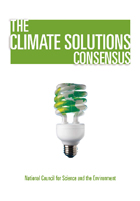
Climate Solutions Consensus presents an agenda for America. It is the first major consensus statement by the nation’s leading scientists, and it provides specific recommendations for federal policies, for state and local governments, for businesses, and for colleges and universities that are preparing future generations who will be dealing with a radically changed climate. The book draws upon the recommendations developed by more than 1200 scientists, educators and decision makers who participated in the National Council for Science and the Environment’s 8th National Conference on Science, Policy and the Environment.
After presenting a lucid narrative of the science behind climate change and its solutions, Climate Solutions Consensus presents 35 practical, results-oriented approaches for minimizing climate change and its impacts. It clearly spells out options for technological, societal, and policy actions. And it deals head-on with controversial topics, including nuclear energy, ocean fertilization and atmospheric geo-engineering.
One of the book’s key conclusions is that climate solutions are about much more than energy sources. They involve re-examining everything people do with an eye toward minimizing climate impacts. This includes our eating habits, consumption patterns, transportation, building and housing, forestry, land use, education, and more. According to these scientists, the time to act is now. With clarity and urgency, they tell us exactly what needs to be done to start reversing the driving factors behind climate change, minimizing their consequences, and adapting to what is beyond our power to stop.
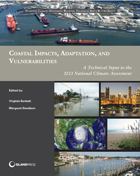
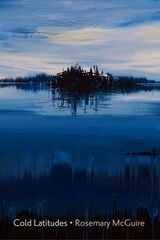

Using his hike along the popular five-hundred-mile Colorado Trail to present his personal observations about more than a hundred miles of dead and dying forest, Karl Ford presents a brief environmental history of these areas of the state, weaving in scientific studies about forest mortality caused by insect infestations, wildfire, drought, and loss of snowpack, and describes the poor current prospects for reforestation as the climate continues to warm. His own Lakota ancestry, as well as historical references to local Tabeguache Ute Chief Ouray and displaced Ute populations, meaningfully frames important conversations about caretaking and connection to place. Ford also proposes potential solutions to drought and forest mortality problems, as well as varying approaches and limitations to mitigation efforts.
The Colorado Trail in Crisis appeals to hikers and nature lovers seeking to learn about the natural history, beauty, and serenity of the Colorado Trail, as well as students, conservationists, and scientists researching climate change effects on Colorado mountain ecosystems.
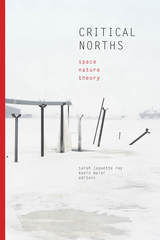
This book brings together scholars from a range of disciplines to ask key questions about the North and how we’ve conceived it—and how conceiving of it in those terms has caused us to fail the region’s human and nonhuman life. Engaging questions of space, place, indigeneity, identity, nature, the environment, justice, narrative, history, and more, it offers a crucial starting point for an essential rethinking of both the idea and the reality of the North.
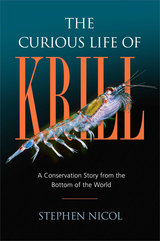
Krill—it’s a familiar word that conjures oceans, whales, and swimming crustaceans. Scientists say they are one of most abundant animals on the planet. But when pressed, few people can accurately describe krill or explain their ecological importance. Antarctic krill have used their extraordinary adaptive skills to survive and thrive for millions of years in a dark, icy world far from human interference. But with climate change melting ice caps at the top and bottom of the world, and increased human activity and pollution, their evolutionary flexibility to withstand these new pressures may not be enough.
Eminent krill scientist Stephen Nicol wants us to know more about this enigmatic creature of the sea. He argues that it’s critical to understand krill’s complex biology in order to protect them as the krill fishing industry expands. This account of Antarctic krill-one of the largest of eighty-five krill species-takes us to the Southern Ocean to learn firsthand the difficulties and rewards of studying krill in its habitat. Nicol lays to rest the notion that krill are simply microscopic, shrimplike whale food but are in fact midway up the food chain, consumers of phytoplankton and themselves consumed by whales, seals, and penguins. From his early education about the sex lives of krill in the Bay of Fundy to a krill tattoo gone awry, Nicol uses humor and personal stories to bring the biology and beauty of krill alive. In the final chapters, he examines the possibility of an increasingly ice-free Southern Ocean and what that means for the fate of krill-and us.
Ocean enthusiasts will come away with a newfound appreciation for the complex ecology of a species we have much to learn from, and many reasons to protect.
READERS
Browse our collection.
PUBLISHERS
See BiblioVault's publisher services.
STUDENT SERVICES
Files for college accessibility offices.
UChicago Accessibility Resources
home | accessibility | search | about | contact us
BiblioVault ® 2001 - 2024
The University of Chicago Press









